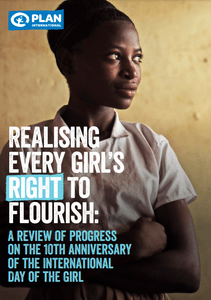Girls’ rights gains ‘slow, fragile and unequal’ – new report
Many girls are worse off than 10 years ago, our latest study finds
11 October 2022A girl growing up today continues to face considerable human rights violations, with little change from 10 years ago, according to new analysis by Plan International.

In a report published on the 10th annual International Day of the Girl, a day celebrating the importance of girls’ rights, the NGO found that a combination of factors – including the COVID-19 pandemic, climate crisis, conflict and the rise of right-wing politics – has profoundly set back progress on girls’ rights. While the International Day of the Girl has considerably raised discourse on issues affecting girls and their rights, and the day’s role in raising awareness on girls and their circumstances must be acknowledged, there is much more to be done.
Though improvements have been recorded on key gender equality indicators, such as education and child mortality, a growing youth population means that more girls are being denied rights today – rights that are guaranteed under international law – than in 2012.
Not one country has achieved gender equality
Together, this means that of the 144 countries in the EM2030 SDG Gender Index, which account for 98% of the world’s girls and women, not one country has achieved gender equality.
As of 2020, more than three billion girls and women still live in countries with ‘poor’ or ‘very poor’ scores for gender equality.
We need to move beyond giving legal recognition to girls’ rights, and urgently back commitments up with new and urgent investment so that every girl has the chance to thrive.
Jacqui Gallinetti, Director of Monitoring, Evaluation, Research and Learning, Plan International
Plan International’s Director of Monitoring, Evaluation, Research and Learning, Jacqui Gallinetti, said: “From attending school to being legally protected from early marriage, every girl should grow up enjoying the rights she is entitled to under international treaties and human rights law. But in 2022, girls around the world still face inequality and exclusion every single day.
“While there have been some significant wins, the progress made on girls’ rights over the last 10 years has been too slow, too fragile and too unequal. As a result, countless girls around the world face the same inequalities that their mothers did years ago. On the whole, it means that progress has not been transformational and 2022 looks little different to 2012.
“This International Day of the Girl is a stark reminder of how much work there is still to be done to achieve gender equality. We need to move beyond giving legal recognition to girls’ rights, and urgently back commitments up with new and urgent investment so that every girl has the chance to thrive.”
Key gains in gender equality:
According to Plan International’s analysis, key gains in gender equality over the last 10 years include:
- More legal protections from certain forms of abuse and harmful cultural practices, such as the banning of child marriage in the Dominican Republic in November 2020 and FGM/C in South Sudan in April 2020.
- Child mortality has dropped to 39 deaths per 1,000 live births for boys and 34 for girls.
- Gender parity has been largely achieved in primary school enrolment and learning outcomes, while secondary school enrolment for females increased from 72% in 2012 to 76% in 2020.
- A 15% decrease in the proportion of young women married as children, meaning the rate has dropped from nearly one in four to one in five.
- A decrease in the global adolescent birth rate amongst girls aged 15–19 from 47 to 41.2 births per 1,000 between 2012 to 2020.
However, change has been slow and unequal, with girls who are growing up in poverty or in conflict settings, living with a disability or identifying as LGBTIQ+ being less likely to benefit from these gains.
Failings in the pursuit of girls’ rights
Key factors that suggest a failure to sustain girls’ development over the course of their lives include:
- Girls and young women aged 15-24 make up the majority of the 267 million young people worldwide who are not in education, training or employment (NEET). In 2019, 42% of young women, compared to 12% of young men, are NEET.
- There are still 5.5 million more girls of primary-school age out of school than boys.
- No region is on track to meet the SDG target of eliminating child, early and forced marriage by 2030.
- In 2019, 43% of sexually active girls (15–19) who wanted to avoid pregnancy were not using modern contraception, leading to 10 million unintended pregnancies and 5.7 million abortions.
- While several countries have improved legal protection of access to safe abortion, others, notably Nicaragua, Poland and the United States, have repealed laws previously protecting the right to safe abortion.
- There has been little legal progress in protecting the rights of LGBTIQ+ people. In 2020, there are still 70 countries that criminalise consensual same-sex activity.
Young people demand Equal Power Now
To mark International Day of the Girl, Plan International has published the Equal Power Now Youth Manifesto written by young activists, which calls on politicians and other leaders worldwide to support girls and young women to participate in politics and decision-making.
This manifesto sits at the heart of Plan International’s Girls Get Equal campaign, which calls for a world where girls in all their diversity are equally able to make decisions about their own lives and shape the world around them.


